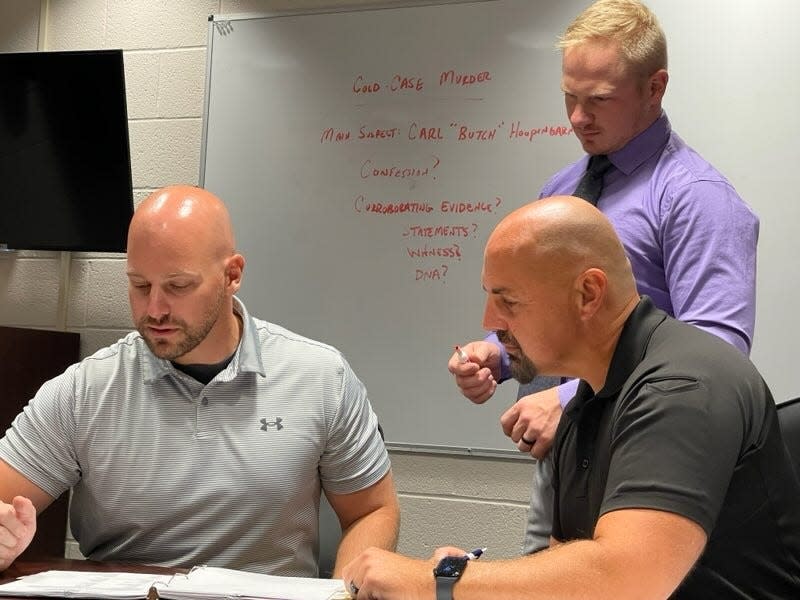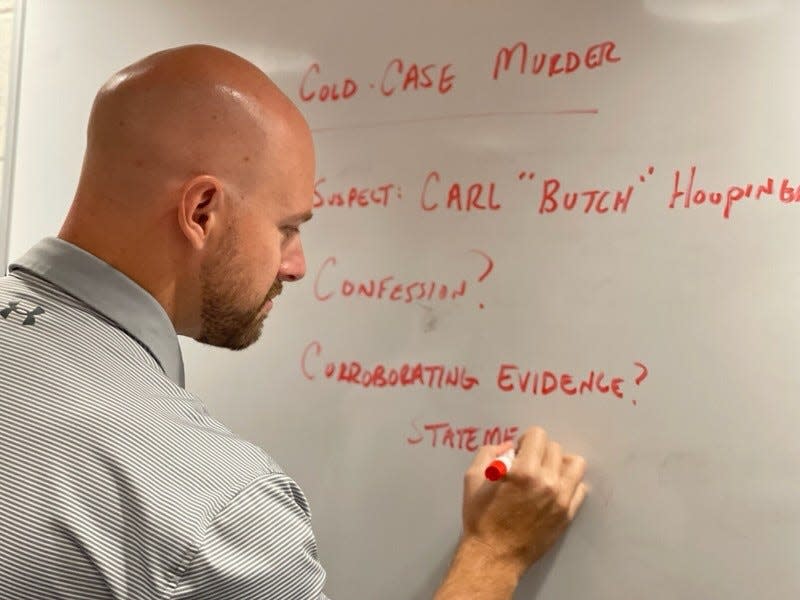Guernsey County Sheriff’s Office closes 34-year-old murder case; started over a pool game
CAMBRIDGE − Guernsey County Prosecutor Lindsey Angler was careful to say nothing can fix a family that has suffered the loss of a loved one at the hands of a murderer.
“Nothing is going to repair the broken hearts of these family members,” she said when discussing the 1990 murder of Guernsey County resident James Bradley. “But if we can get them closure and some understanding of what happened, then it’s a good day.”

Bradley was murdered 34 years ago outside a bar that, at the time, was called the Raven. His murderer, Carl “Butch” Hoopingarner, 60, confessed to the crime earlier this year after being detained by the Guernsey County Sheriff’s Office for a suspected homicide in Colorado. He pled guilty to the aggravated murder charge for Bradley’s death in court June 14.
Hoopingarner was sentenced June 27 by the Guernsey County Court of Common Pleas Judge Daniel G. Padden to life in prison with the possibility for parole after serving 20 years. The Guernsey County resident was also sentenced to a consecutive 5-to-7.5-year prison term for aggravated trafficking in drugs, a second-degree felony, stemming from a Belmont County case.
“The earliest he’ll be eligible for parole is 2049,” said Angler. He must also register as a violent offender. No restitution was ordered in this case, according to court records.
Angler said the sheriff’s office stayed on this case until they could get their suspect into custody.
“I’m extremely proud of our law enforcement agencies. They never give up on these investigations,” said Angler of cold cases. “We’re lucky to be in a community with law enforcement officers that care so deeply about the right people being held accountable.”
Just because a case is out of sight does not mean it ever goes out of mind for law enforcement, she said.
“The cases that are not solved stick with them,” she said. “You never know when today is the day you get the information you need to get a result like this. They don’t give up.”

The 34-year hunt for a killer
Back in 1990, Bradley was found dead in his car after it had been lit on fire, according to Sgt. Bill Patterson of the sheriff’s office, who along with his team, Det. Ryan Patterson, and Lt. Sam Williams, was responsible for bringing Hoopingarner in.
How he died and what happened is a bit murky. To start with, there was very little physical evidence.
“No autopsy was conducted,” said Patterson. When asked if exhuming the body was a possibility to glean physical evidence that could better explain what happened to Bradley, Patterson was quick to point out: “He was cremated.”
Patterson said he doesn’t know why an autopsy wasn’t conducted in 1990, but that “the requirements of documentation were not the same as they are now.”
At the time of Bradley’s death, the sheriff’s office wasn’t convinced it was simply accidental that the victim’s car caught on fire, so it remained open as a cold case given they had no physical evidence or eyewitness statements to provide any leads on the case.
Thirty-one years later, they got the call that every detective working a cold case is desperate for — somebody knew something.
“In 2021, we got a phone call that a prisoner in Monroe County jail had information on our cold case,” said Patterson. “I went down and conducted an interview in Monroe County jail and this guy says he knows (Hoopingarner) and that (Hoopingarner) admitted that he was involved in the death of James Bradley.”
Patterson said the informant gave them a substantial statement with details only the murderer would have known. At the time, Hoopingarner was in an Ohio prison with eight months left on his sentence.
“We just waited it out,” said Patterson. “He wasn’t going to talk with us willingly.”
At the same time, Patterson started working a drug case on Hoopingarner in conjunction with Belmont County, of which Hoopingarner is now serving the 5 to 7 .5 years.
“We were trying to get enough evidence to get him into jail so we could talk to him,” said Sgt. Patterson. “We filed charges and put a warrant out for his arrest (following his release from prison). When it came time to arrest him, we executed the search warrant to take him into custody, and he’s gone.”
Fast forward to February 2024, and the sheriff’s office is contacted by the Colorado Bureau of Investigation — they’ve got warrants out for Hoopingarner’s arrest. He’s accused of murdering a Guernsey County resident in Colorado and they believe Hoopingarner fled in the victim’s car, back to Guernsey County.
“So, we started to track him by cell phone and other means, but no luck,” said Sgt. Patterson, adding that Hoopingarner later admitted to destroying his cell phone so he couldn’t be traced. He also later admitted that he knew he had warrants out for his arrest in Guernsey County, which is why he fled to Colorado. “So, we started checking addresses where he was known to live in Ohio.”
He said at that point, Det. Patterson checked on one of the addresses in Buffalo. He drove by the house on Feb. 20 and saw the Colorado victim’s car sitting outside, said Sgt. Patterson.
“We surround the house and meet with the homeowner who confirms Hoopingarner is inside,” said Sgt. Patterson. “Hoopingarner walks out and surrenders to law enforcement.”
Holding Hoopingarner responsible 34 years later
When the sheriff’s office took Hoopingarner into custody in February, Hoopingarner gave them an absolutely “far-fetched, fabricated story that couldn’t have been true if he wanted it to be,” about the Colorado homicide he’s suspected of, said Sgt. Patterson.
“When we say ‘This can’t be true,’ he confesses to the homicide in Colorado,” said Sgt. Patterson, who added the Colorado case is still under investigation. Hoopingarner would be extradited to Colorado only if he is paroled in 2049. “But he denies his involvement in the murder of Bradley, so we stopped the interview and told him to let us know if he wanted to talk.”
The next morning, Hoopingarner asked both Sgt. Patterson and Det. Patterson to come back.
“He apologized to us and said, ‘I lied to you,’” said Sgt. Patterson. “He then gives us pretty much verbatim the same statement that (the informant gave us) back in 2021.”
He said none of those details had been public record or reported in the news.
“There was no way these two people would have had that same information.”
During Hoopingarner’s confession, a third witness was implicated. When the sheriff’s office tracked that person down, they got a third statement that supported the first two.
So, what really happened Aug. 19 and Aug. 20 of 1990?
According to Sgt. Patterson, what they believed happened on Aug. 19 and Aug. 20 that led to the death of Bradley all started over a pool game.
“Hoopingarner says they’re at a different bar in Cambridge before they all end up at the Raven,” said Sgt. Patterson. “At the previous bar, they have a fight over a pool game and Hoopingarner and another person leave that bar.”
Sgt. Patterson said it’s not clear if they went back roading or to someone’s house but at some point, they end up at the Raven. And when they walked in, lo and behold, the same people they fought with at the previous bar were at the Raven. One of them was Bradley.
“The bartender tells Hoopingarner to leave because he’s intoxicated, so he leaves and drives to his mother’s house,” said Sgt. Patterson.
He said two witnesses corroborated that Hoopingarner siphoned gasoline out of a motorbike. Sgt. Patterson said when the witnesses asked Hoopingarner what he’s doing he told them to “Leave me alone and don’t worry about it.”
Hoopingarner went back to the Raven and waited for Bradley to leave, according to Sgt. Patterson. Then, while Bradley is in his car, he and Hoopingarner got into a fight.
It’s at this point Sgt. Patterson must draw his own conclusions, as it’s unclear from witness statements, he said, or even from Hoopingarner’s confession, exactly what happened next. An autopsy could have solved the issue, but that was, again, never conducted.
“Some things indicate a knife was involved,” said Sgt. Patterson. “Witnesses mention seeing stabbing motions.”
Sgt. Patterson said Hoopingarner only admitted to “dumping gasoline on Bradley and the car, and some admissions to how the fire was started.”
“(Hoopingarner) tried to implicate someone else in starting the fire,” said Sgt. Patterson. “And he tried to say Bradley was intoxicated (and that’s why he didn’t try to escape the fire).”
But according to Sgt. Patterson, witnesses said Bradley made no noise and had no reaction to the fire, leading him to believe that Bradley could have already been dead or near death, at the time the fire was started.
When asked about holding those witnesses accountable who stood by and did nothing, Sgt. Patterson said many of the charges that would have applied in 1990 are no longer available for prosecution.
“We’re well past the statute of limitations for many of the charges (for bystanders and witnesses),” he said. “We’re still investigating all avenues. If we can hold anyone else responsible, we will.”
Cold cases are never truly cold
One of the hardest parts about law enforcement is there isn’t always a finished product, said Sgt. Patterson, who has been working cases for 15 years.
“It’s not like construction, where you get to build a house and stand back and look at the final product,” he said of working cases that often don’t see closure, or they see less than favorable closures when a sentence or charge is less than what they want. “When you get to close a cold case — in this case, waiting 34 years for justice — I don’t know that there’s a more satisfying feeling than to sit down with a family member and say we have enough to bring closure, to bring justice for their lost family member.”
Sgt. Patterson said of the Hoopingarner case that the hurry up and wait course of the case was difficult.
“For me, I have very impatient tendencies, so to sit back and wait can be frustrating,” he said. “But I knew we were heading down the right path. Working a case in its entirety and having the patience required for a long-term investigation is necessary.
“The most important thing is that the families can have closure,” said Sgt. Patterson. “Justice, in this case, was served.”
This article originally appeared on The Daily Jeffersonian: Guernsey County Sheriff’s Office closes 34-year-old murder case

